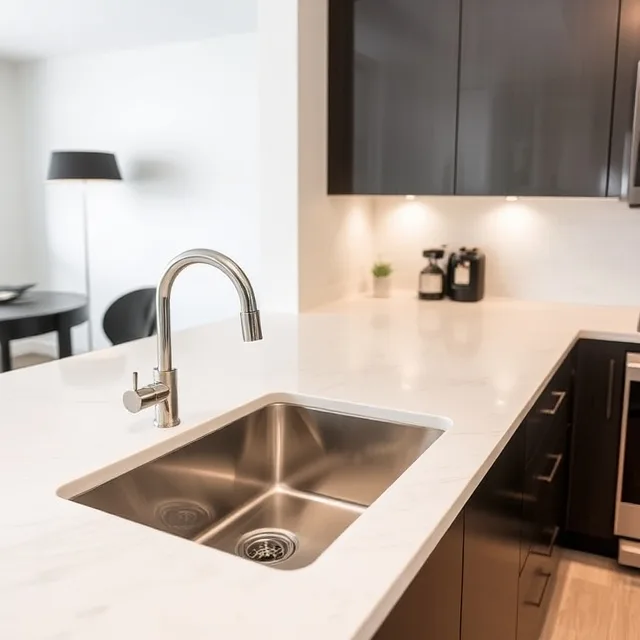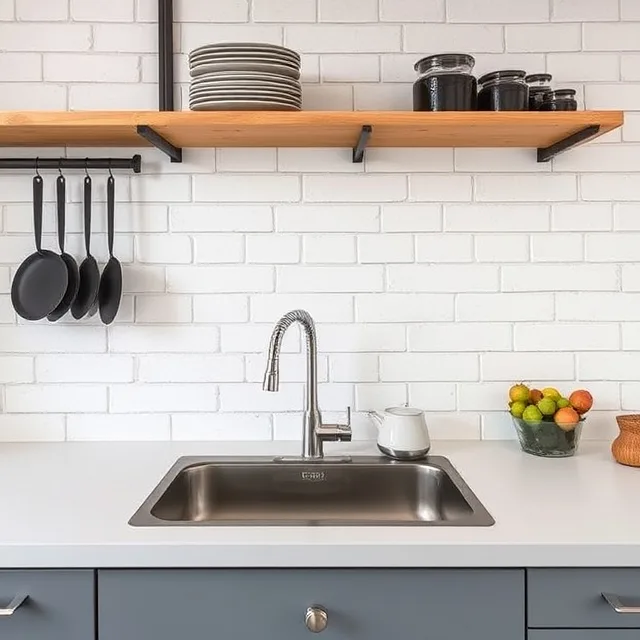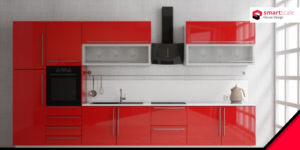When building or renovating a kitchen, most people focus on cabinets, countertops, and appliances. But the kitchen sink is just as important. It’s one of the most-used fixtures in the kitchen used for washing vegetables, cleaning utensils, and prepping food. So, choosing the right sink can make your daily kitchen tasks easier and more efficient.
In this blog, we’ll help you understand the different types of kitchen sinks available in India and guide you on which one is best suited for your needs.
Table of Contents
Toggle1. Stainless Steel Sink
Stainless steel sinks are the most common and practical option for Indian kitchens. They are made from a mix of chromium and nickel, which gives them durability and resistance to rust and corrosion.
Pros:
Budget-friendly: Easily fits into most kitchen budgets.
Rust-resistant: Doesn’t corrode easily, even with daily use and exposure to water.
Easy to clean: Just wipe with a cloth and mild cleaner—no special maintenance required.
Variety of sizes: Available in multiple sizes, shapes, and finishes to match all types of kitchen designs.
Cons:
Noisy: Can make clanging sounds when washing utensils unless sound pads are added.
Shows marks: Water spots and scratches can show up if not cleaned regularly.
Best For:
Most Indian families, especially those who cook daily and need a reliable, easy-to-maintain sink.
2. Quartz or Granite Composite Sink
These sinks are made by combining natural quartz or granite with resin, offering a beautiful matte finish and a modern look. They’re extremely strong and long-lasting.
Pros:
Scratch and stain-resistant: Doesn’t easily get scratched by steel utensils or stained by masalas or turmeric.
Color options: Available in black, grey, beige, and more—blends well with modern kitchens.
Stylish finish: Gives a rich, premium feel to the kitchen.
Low noise: Quieter than steel when washing dishes.
Cons:
Higher cost: More expensive than stainless steel.
Heavier: Needs strong support and professional installation due to its weight.
Best For:
Modern modular kitchens, homes with a contemporary design style, and those looking for a noise-free sink option.
3. Ceramic Sink
Also called fireclay sinks, ceramic sinks have a smooth and glossy finish, similar to what we see in old-style or European kitchens. Though less common in India, they are gaining popularity for their aesthetic appeal.
Pros:
Elegant appearance: Adds a classic or vintage charm to your kitchen.
Heat and stain-resistant: Can handle hot pots and won’t absorb turmeric or oil stains easily.
Smooth surface: Feels premium and is easy to wipe clean.
Cons:
Prone to chipping: If you drop a heavy kadai or vessel, the surface can crack.
Expensive: Costs more than regular sinks.
Not for rough use: Not suitable for very busy or heavy-duty Indian cooking.
Best For:
Designer kitchens, vintage-themed homes, or those who want an eye-catching sink that’s more about style than utility.
4. Acrylic Sink
Acrylic sinks are made from a plastic-like material and come in multiple colors and designs. They are not as durable as other options but are lightweight and very easy to install.
Pros:
Lightweight: Can be installed easily without any special support.
Smooth and stylish: Has a clean finish that looks good in simple kitchens.
Cost-effective: Good option for tight budgets or temporary kitchens.
Cons:
Less durable: Can crack, scratch, or melt under high heat.
Stains easily: Haldi and other Indian spices can leave permanent marks.
Not heat-resistant: Not suitable for placing hot utensils or boiling pots directly.
Best For:
Rental homes, temporary setups, or light-use kitchens with minimal cooking needs.
5. Double Bowl vs Single Bowl Sink
Single Bowl Sink:
This type of sink has one large, uninterrupted compartment.
Advantages:
More space for big utensils: Easily fits large kadais, pressure cookers, or trays.
Compact footprint: Ideal for small kitchens as it doesn’t take up too much counter space.
Easier to clean: You don’t need to move dishes between bowls.
Disadvantages:
No separation: Washing and rinsing happen in the same space, which can be messy at times.
Double Bowl Sink:
This sink is divided into two sections both can be the same size or slightly different.
Advantages:
Multitasking made easy: You can wash dishes in one bowl and rinse or dry them in the other.
Organized workflow: Great for separating dirty dishes from washed ones.
Better hygiene: Helps prevent cross-contamination when prepping vegetables and washing utensils together.
Disadvantages:
Takes more space: Not ideal for compact kitchens.
Smaller compartments: Each bowl is smaller than a single bowl, making it harder to wash large pots.
Which One Should You Choose?
If your kitchen is small and you often wash large utensils, go for a single bowl sink.
If you have ample space and like keeping your washing and rinsing tasks separate, a double bowl sink can be a more convenient choice.
What to Consider Before Buying a Kitchen Sink
Kitchen Size: Choose a sink that fits well within your counter space.
Usage: If you cook frequently and wash many dishes, go for a deep and durable sink.
Installation Type: Decide between top-mount (easy to install) and under-mount (sleeker look).
Material: Consider how much maintenance you’re ready for. Stainless steel is low-maintenance; quartz and ceramic require more care.
Budget: Stainless steel and acrylic are budget-friendly. Quartz and ceramic are on the premium side.
So, Which Sink Is Best for Indian Kitchens?
For most Indian homes, a stainless steel single-bowl sink is the most practical option. It’s durable, affordable, and perfect for regular cooking needs. However, if you’re going for a modern, noise-free, and elegant kitchen, quartz or granite composite sinks are worth considering. Ceramic is a good choice for aesthetic-focused kitchens, while acrylic can be considered for temporary or low-usage settings.
Our Thoughts
The best kitchen sink depends on your cooking habits, design preferences, and budget. Don’t just focus on looks think about long-term durability, ease of cleaning, and functionality. Choose wisely, because a good sink will serve you for years to come.
Need Help with Kitchen Design?
At SmartScale House Design, we help you choose the right fixtures, finishes, and layout that suit your lifestyle and budget. Whether you’re designing a compact kitchen or a luxury space, our experts will guide you every step of the way.
Contact us today to get started on your dream kitchen with a design that’s both functional and beautiful.













